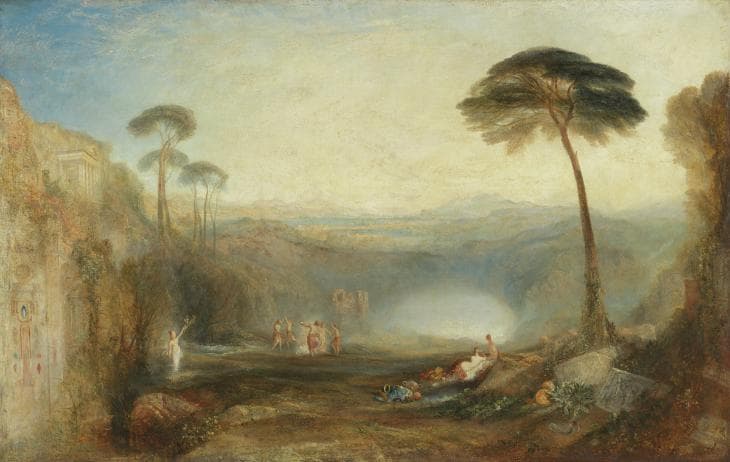An Unexpected Journey #
First of all, thank you if you are reading this. It will be different from the other blog articles I have in mind: as an introduction, I want to let you know how the idea about this website was born and what it is meant to be – in my mind, at least.
Now, I’d like to point out that I usually didn’t like talking about religion — or generally, that I didnt’ like religions. Despite that, in the summer of 2021, a friend of mine, a neighbor, while chatting about religion(!) and myths, recommended a text: “You should read The Golden Bough by Frazer. Therein, there is everything”. I never heard about Frazer before, so I immediately searched on Wikipedia. The book abstract looked interesting, but not great: starting from the legend behind a painting, the author explores the reasons of a brutal yet methodical ritual that was committed in central Italy, in the woods near Aricia (Ariccia in modern Italian).

“The Golden Bough” by J. M. W. Turner, which ingnited James G. Frazer’s curiosity.
‘Cool, I know that area,’ I thought while my mind immediately went to the famous porchetta. Since it was very cheap, I immediately bought the volume; only the next day, when I could hold it in my hands, I realised how massive it was. In that pocket edition, it is still a 840-page bold compendium about lore. Nevertheless, I wasn’t discouraged and slowly started flipping through its pages.
A New Perspective #
After a while, it was clear to me that it was necessary to take notes about that enormous amount of information. Until then, I used a paper moleskine-like notebook filled with bad writings, but in this case it would have been a mess. Luckily, in those days I became aware of Obsidian, a powerful tool which allows you to link easily one note with another, so I immediately started writing down annotations.
The first hundreds of pages introduce the story of Aricia’s King of the Wood (a high-priest) and the mysterious ritual regarding his succession: he was killed violently using a blade, every year. To simplify, the question is: why using such violence in the Classical era (Greek and Roman), when barbarian traditions should have been abandoned? It was a very interesting question, but the book rhythm is very – VERY – slow. To do a comparison, it was like asking: ‘After how much time should a pancake be flipped on the pan?’ and answering: ‘Well, I’ll first explain why Earth is round’. To be honest, my interest grew very slowly through the first half of the book.
It was like asking: ‘After how much time should a pancake be flipped on the pan?’ and answering: ‘Well, I’ll first explain why Earth is round’.
My enthusiasm was dropping quicker than I expected, but then one of the great strong points of the tome came out: logical connections. Some terrific observations started to make me think and the interest was kept alive with examples and hypotheses: one above all, the evolution of magic into religion. I began to really appreciate the author’s style, but anyway it was a very time-consuming read.
Therein, There Is Everything #
Work duties needed attention, Summer passed and Fall came quickly. Leaves were already on the ground when I opened again the tome; but something had changed in the meanwhile. During these last few weeks –or better, days– I finished the book with a sprint. In the last two-hundred pages, as the end of the journey was approaching, I realised what the big change was: the author’s talent as teacher erupted like a volcano.
I was aware that Frazer’s intention was to explain the common roots of traditions of civilisations from all the globe since the first pages, but only towards the end I became conscious of his great ability to gradually prepare the reader to accept his hypotheses. Of course, he humbly repeats that he could be wrong through his passages; but while the two of them (author and reader) finally close the loop in the very final chapters, everything makes perfect sense. For me, the last pages were almost emotional after such a long trip through time and space!

A little spoiler about the book – meme edition.
Now, despite the huge pleasure that it gave me, I don’t know if I would ever suggest everyone to read The Golden Bough. I’d only make them angry because it can be so heavy. But that’s when the idea for this website came it. Wouldn’t a collection of cool findings about folklore be awesome? An explanation (not to be taken too seriously) about, for instance, why the oak tree is so important for many civilisations? Why Vampirism was accepted in all the continents? Or, simply, a fun fact about why the ocean’s low tide is considered a bad omen?
Out there, in the internet wilderness, it’s full of blogs like this. But this is mine, and it will be replenished of interesting notes as long as I’ll keep doing –in my opinion– remarkable discoveries in my spare time. I LOVE reading and writing about these topics, so I hope to shake up your interest.
Last thing: if I got your attention, you could consider reading or downloading The Golden Bough for free on Project Gutenberg – I hope you will be hooked as I was.